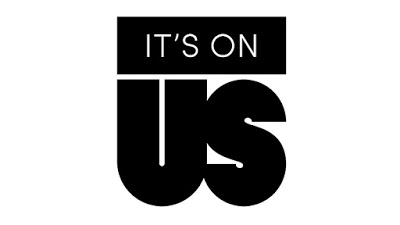"Saying No"-- Changing A Societal Norm
posted: Oct. 13, 2020.
"Saying No"
-Pearl Jam
He says to her he wants it easy
He expects her, to be easy
He wants it, to be, easy
But she says no, but she says no, I don't want to
She says no, she says no, I don't want to
He expects it too, easy...
But she says stop, you gotta stop
When he says go, you still gotta stop
When she says stop, you gotta stop
When he says go, you still gotta stop...
I am not proclaiming to be an expert on sexual assault or rape, nor do I specialize in it in my practice. But from time to time I do see clients who have been the victim of rape. It incenses me and frightens me every time I hear about it. I see how scared and embarrassed and helpless they are and just imagine this happening to my daughter. I don't know what I would do if this happened to her, but as a professional to my clients, I want justice for them. I want them to see the perpetrator held accountable for their heinous actions. I want my clients to know they didn't "ask for it", that just because they may have initially gave consent, doesn't mean they cannot retract it... they can say NO at ANYTIME!! I want them to know that when they are under the influence of alcohol (or other substances), their ability to give consent is impaired. Even if they say Yes, they may not be entirely capable of making that decision.
I tell them all of these things but you know what?? It does not matter, it does not take away the damage that it caused. My words do not take away the pain, shame and embarrassment they feel, blaming themselves for someone else's actions. My words do not take away the fear of public ridicule they feel, or may experience through social media when "word gets out". My words cannot neutralize the words they hear from their friends and family, who tell the victim not to press charges, or question them on what they were doing that may have led to the "alleged" rape. What I say has little effect when society on the whole normalizes the behavior.
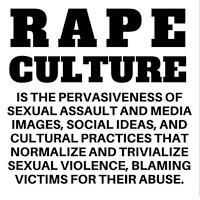
Rape Culture:
A rape culture is created when sexual violence becomes normalized and tolerated among members of society. A rape culture is often formed when the general members of society learn and perpetuate rape myths, which is largely influenced by media and popular culture. The term rape culture originated when feminists released the film “Rape Culture” in January of 1975 to raise awareness of the normalization of sexual violence in society. This documentary was the first to establish the relationship between rape and our culture's sexual fantasies by examining popular culture and media. Feminists realized that they needed to take a stand against rape culture and make people aware of its consequences if they were going to make a change.(www.historyofrapeculture.weebly.com)

One place rape culture has been most prevalent is in the entertainment industry. It's front page news right now with all the allegations made against Harvey Weinstein, a big-time Hollywood executive. Stories about the "casting couch", almost like a punchline, go way back to the beginning of the movie business. Unspoken behaviors were "accepted" as part of the process for a young female actor to get recognized in the business. When someone was a victim of a sexual assault by one of these powerful executives, no one believed them, or no one wanted to get involved, or worse, they may have said to the victim something like, "Well, you wanted that part didn't you?", or "In order to make it in this business, you need to...".

This behavior has been happening in the workplace everywhere for the longest time. The movie "9 to 5" although a comedy, depicts pretty well how women are exploited, and how sexual harassment is normalized. I know there are endless examples of this but that just shows how desensitized our society is from such a serious issue, and how sexual assault and rape readily become an "accepted" part of society.
Sexual Assault: is a sexual act in which a person is coerced or physically forced to engage against their will, or non-consensual sexual touching of a person.
Rape: unlawful sexual activity and usually sexual intercourse carried out forcibly or under threat of injury against the will usually of a female or with a person who is beneath a certain age or incapable of valid consent.
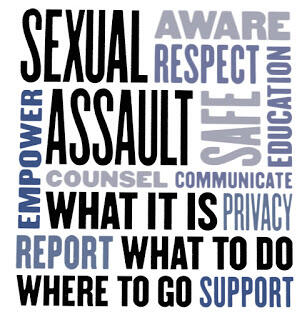
Some Facts about Rape
- Low estimate of the number of women, according to the Department of Justice, raped every year: 300,000.
- High estimate of the number of women raped every year: 1.3 million
- Percentage of rapes not reported: 54%
- A woman's chance of being raped in the U.S.: 1 in 5
- Rank of U.S. in the world for rape: 13th
- A woman's chance of being raped in college: 1 in 4 or 5
- Percentage of sexual assault and rape victims under the age of 12: 15%
- Percentage of men who have been raped: 3%
- Percentage of men who are never incarcerated: 97%
- Percentage of rapes that college students think are false claims: 50%
- Percentage of rapes that studies find are false claims: 2-8%
- Chances that a woman in the U.S are raped versus getting breast cancer: 2 to 1.
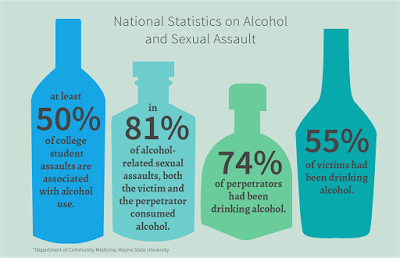
Look at the statistics for college rape. Here are some more: One in five college women is a survivor of rape or attempted rape. About 3/4 of sexual assaults on college campuses involve alcohol use. Nine out of 10 sexual assaults of college students are committed by someone known to the victim.
Title IX in college: Under Title IX, discrimination on the basis of sex (specifically discrimination against girls and women) can include sexual harassment, rape, and sexual assault. A college or university that receives federal funds may be held legally responsible when it knows about and ignores sexual harassment or assault in its programs or activities. The Department of Education Secretary, Betsy DeVos rescinded this directive because she believed it treated the accused unfairly, and instead wanted to implement something that would do a better job at balancing the rights of victims and the accused.
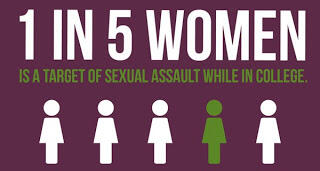
Look at the statistics again, when twenty percent of women on college campuses are being raped, Fifty percent of rapes college students believe are false (when in fact only 2-8% are false claims), seventy-five percent of sexual assaults on campus involve alcohol, and fifty-four percent of rapes are never reported (in general), should we really be focusing on changing Title IX to accommodate the accused???? Or maybe we should be focusing instead on the behaviors and activities that most likely lead to an increase in the incidence of sexual assault or rape on campuses. What do you think? Hmm?
I believe all college students should be required to attend a campus conduct course, which should include learning school conduct policies, alcohol and drug abuse awareness, sexual assault and rape awareness including state and federal laws, and then test out of the class with a signed acknowledgement of awareness. Then any violation could include some disciplinary action from suspension to expulsion from the school. This is just a thought off the top of my head, but you can see where I am going with this.
But because the rape culture continues to exist in this country, and old out-of-touch billionaire bureaucrats are charged with running these departments and institutions, short-sighted, ill-conceived, ignorant decisions will persist.
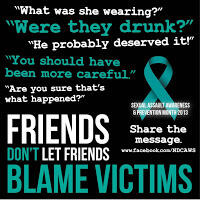
So what should we do??
Educate, Inform, and Empower!!!
It isn't enough for women to know they can "Just Say No". Whether or not women know about sexual assault and rape, they can still be victims. For those who have been the victim of rape or sexual assault, they need resources to help them through the process, such as law enforcement, counselors, medical professionals, and support groups. They need support from family and friends who believe what they are reporting, and take them and the situation seriously. They need the time and assistance of all the aforementioned resources to help them get the life back that was taken from them, and get some kind of closure so they can move on with their lives.
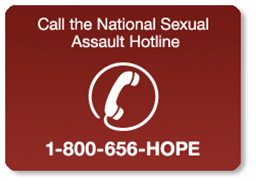
On the school level, more attention needs to be paid to understanding sexual assault and rape, for girls ANDboys. They need to understand the "Do's and Don'ts" in intimate situations, regardless of whether or not they are in a relationship. They need to understand the impact alcohol and drugs have on decision-making and judgement, not just when "operating heavy machinery". They need to know that at ANY TIME if one or the other is uncomfortable with what is going on they can say STOP, or NO and the other person MUST COMPLY...PERIOD! There is no gray area here, NO REALLY DOES MEAN NO..."When she says stop you gotta stop!!"
At home, parents need to model appropriate behavior to the opposite sex. Children should not see a woman (or a man for that matter!) being treated in a subservient way, nor should they see women be treated as possessions or objects. It is important for BOTH parents to educate their children how to treat both sexes. I believe it is also important to teach them to not turn a blind eye to violence that may be happening around them. Just because it isn't happening to them, doesn't mean they cannot be held accountable; in addition to a moral and ethical responsibility there. If they see or hear something, they should tell someone of authority. It is a reflection on YOU, the parent when your child commits an act of violence on another person, especially when it is sexual violence. * Remember that and ask yourself if you have properly taught your child(ren) about the seriousness of this issue. The time is now to change the culture for good!
